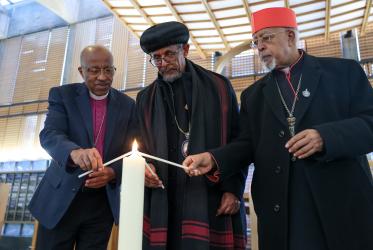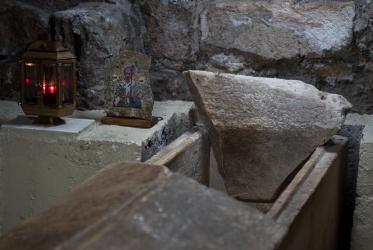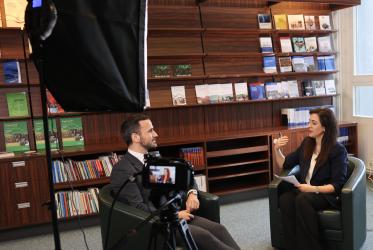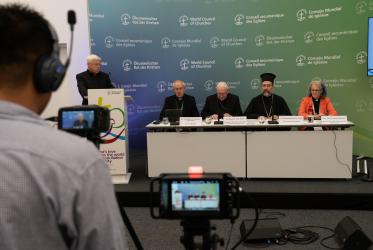I was sitting in the space reserved for media, in the back of the plenary hall, when Cardinal Kurt Koch, president of the Pontifical Council for Promoting Christian Unity, of the Roman Catholic Church, brought greetings from Pope Francis to the 12th Assembly of the Lutheran World Federation (LWF), on 13 May, in Windhoek, Namibia.
The formal ovation that followed his speech made an intriguing contrast with the content of the message that was just witnessed by more than 500 people in the room.
Lutherans from around the world were gathering in the Namibian capital for LWF’s highest decision-making body, that meets normally every six years. The event was deeply inspired by the historic commemorations of the 500th anniversary of the Reformation.
Cardinal Koch’s carefully written words aimed at that aspect of the event: “If mercy and reconciliation form the guiding perspectives of the ecumenical path, above all in this year of the Reformation commemoration, we can walk together through the open door to a positive future”, he read.
The LWF put a lot of energy in the process that led to the historic reconciliation between the Roman Catholic Church and the Lutheran Communion, celebrated in October 2016, in Lund, Sweden. In the weeks and months that followed the event in Lund, it became clear that the Joint Ecumenical Commemoration of the Reformation has had profound significance for global ecumenism and, in many ways, pointed the way toward a new momentum in the ecumenical movement. Windhoek brought clear echoes from the same message.
“After the prayer of confession and reconciliation in Lund on Reformation Day 2016, those relations will never be the same”, said the general secretary of the World Council of Churches, Rev. Dr Olav Fykse Tveit, in his formal greetings to the LWF Assembly, two day before Koch addressed the same audience.
Tveit was pointing to the waves created by gestures of reconciliation and how such acts are important to follow words and statements. If the wounds of conflicts were so visible over the last centuries, it is our responsibility to make reconciliation and hope even more visible.
As member of the WCC staff, I took part of the LWF Assembly as an accredited media person. My main responsibilities were to cover the event for the WCC and to coordinate the set up and dynamics of the WCC exhibition booth at the “Omatala”, the Assembly’s market place.
Switching from the media center to the plenary, then to the Omatala and back to the media center several times a day, I had the chance to witness clear signals of what the outgoing president of the LWF, Bishop Munib Younan, called “an ecumenical spring”.
Younan used the term “ecumenical spring” in his address to the Assembly, as a way to express his great hope for the fruits that the reconciliation between Lutherans and Catholics might bear for the wider ecumenical movement and the role Lutherans worldwide can play in this process.
“No matter how difficult and long it is, I encourage the communion to continue this process because it is Christ’s call: to have one baptism and one table for the Eucharist. It continues to be my conviction that the Eucharist is at the table of Christ, not a Lutheran, Catholic, Reform, Anglican, or Orthodox table. It is Christ’s table of generosity”, he said.
“God’s word and promise makes a thing holy, not any human effort or label. In other words, the event in Lund is not yet finished. Its positive energy continues to expand, even into interreligious relations”, concluded Younan.
There was no dedicated space of reflection or discussion focused on this issue, but, somehow, the catchy issue of an “ecumenical spring” was quite visible for me during those days in Namibia.
I am among those who believe that ecumenical seasons are defined not only by statements and acts promoted by church leaders, but also by the winds coming from the grassroots experiences at local congregations and personal initiatives that exponentially echo the call for unity. Therefore, what is happening today in the ecumenical movement brings me great excitement.
During the Assembly, together with the LWF communications team, we had the opportunity to have the general secretaries of the WCC and LWF in front of our cameras for a conversation on selected topics. We invited them to share their thoughts about the 500 years of Reformation, the theme and subthemes of the Assembly and the “ecumenical spring”.
Both Rev. Dr Martin Junge, LWF general secretary, and Tveit had interesting and positive remarks about the latter topic.
For Junge, the current positive momentum of the ecumenical movement is “a consequence of the prayers, the trust and the theological discernment that came together and made space for steps to be taken forward”.
Tveit added that the so-called ecumenical spring “is much more than a promising perspective to what we are doing”. There is a willingness to walk together and to do together much more than before. This is related to our spirituality, to our diakonical work and common witness in the world”, he said.
The reconciliation cannot remain only an end in itself. What the younger generations have witnessed in Lund and Windhoek might be crucial to boost their enthusiasm and engagement in the work for unity worldwide.
Toward the end of his address to the Assembly, Koch said he was “thankful for the fact that we are able to celebrate the centenary of the Reformation in ecumenical communion for the first time in history”. I think we all are.
We live in challenging times. The three subthemes of the 12th Assembly of the LWF stated that human beings, salvation and God’s creation are not for sale. Just a few days after the closing of the Assembly, a tweet from Pope Francis, on 20 May, seemed to echo the message from Windhoek: “Peace must be built on justice, on integral human development, on respect for human rights, on the protection of creation”.
It looks like church people in Windhoek, Rome, Geneva and Lund are not using the same language, but delivering the same message. The “ecumenical spring” might be bringing some strong winds of hope.






